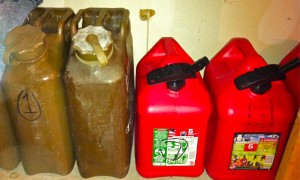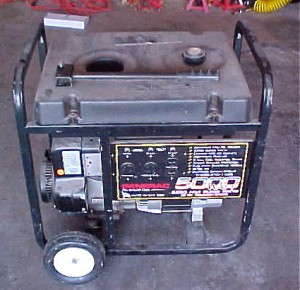 To become more self-reliant we try to determine what ‘needed’ items to store; one to think about is fuel. Though there are several types of fuel preppers store: gasoline, propane, diesel, and kerosene; gasoline is the hardest to store long-term and, yet, is the most commonly used.
To become more self-reliant we try to determine what ‘needed’ items to store; one to think about is fuel. Though there are several types of fuel preppers store: gasoline, propane, diesel, and kerosene; gasoline is the hardest to store long-term and, yet, is the most commonly used.
My main reason for storing gasoline is for use in our (gasoline) generator during a power failure. When people believe that disaster is looming–recently during Hurricane Irene, for example–they rush out and buy generators. But how many of them think to store fuel to run those generators? Our Generac 5000 generator has a five gallon fuel tank, it will run approximately five to seven hours on a tank of gasoline. My plan is to use our battery bank (four AGM deep cycle batteries) until depleted, then use the generator to recharge the batteries while still maintaining power to needed appliances. To ensure enough energy to last most power outages we need to store a reasonable amount of gasoline. But couldn’t we just drive to the gas station and get more gasoline? Maybe, but does the gas station have power?
 We also want to store gasoline for our vehicles if we had to evacuate; gasoline may either be unavailable (gas station closed because of a power outage) or there may be excessively long lines to get it. We’d also like to have enough gasoline to take with us: to ensure we can reach our BOL, and to use there if power and/or gasoline aren’t available at our destination.
We also want to store gasoline for our vehicles if we had to evacuate; gasoline may either be unavailable (gas station closed because of a power outage) or there may be excessively long lines to get it. We’d also like to have enough gasoline to take with us: to ensure we can reach our BOL, and to use there if power and/or gasoline aren’t available at our destination.
As we’re discussing storage it has to be stressed that gasoline is very flammable and must be stored in an appropriate container in a safe place. It is also relatively heavy–approximately 6.1 pounds per gallon–but at about 30 pounds for five gallons it can still be conveniently handled.
It’s hard to find definitive information about how long gasoline can be stored before it goes bad. But what does ‘bad’ even mean? Gasoline is a refined petroleum-derived chemical which–over time, and compounded by improper storing and temperatures–can break down by:
- evaporation causing it to lose it’s volatile components (necessary for igniting)
- drawing in water vapor that can cause separation – where water, since it’s heavier, settles to the bottom of the tank
- oxidation causing it to become sludgy which can build up inside of small parts *
There are other unknowns, beginning with how old was the gasoline when you bought it (was it fresh from the refinery or already a month old?). What temperatures has it been exposed to and for how long? Was it properly stored by keeping it tightly covered, clean, dry, and cool? So, as a rule of thumb, if you plan to store your gasoline for more than a couple of months you should add a gasoline stabilizer.
 The most common brand of stabilizer is Sta-Bil Gas Stabilizer. According to Sta-Bil’s website, using their product will keep fuel fresh for 12 months; you can double the dosage and fuel will remain fresh for 24 months. It’s added at a ratio of one ounce of Stabilizer to 2 1/2 gallons of gasoline. A 32-ounces bottle costs about $12, so it’s roughly $0.40 an ounce, which is only $0.80 for each 5-gallon gasoline can you store. If you store 30 gallons (check with local ordinances on amount you can legally store) it’d cost you less than $5.00 per year.
The most common brand of stabilizer is Sta-Bil Gas Stabilizer. According to Sta-Bil’s website, using their product will keep fuel fresh for 12 months; you can double the dosage and fuel will remain fresh for 24 months. It’s added at a ratio of one ounce of Stabilizer to 2 1/2 gallons of gasoline. A 32-ounces bottle costs about $12, so it’s roughly $0.40 an ounce, which is only $0.80 for each 5-gallon gasoline can you store. If you store 30 gallons (check with local ordinances on amount you can legally store) it’d cost you less than $5.00 per year.
I add three ounces of Stabilizer (I want an extra buffer) to each 5-gallon container of gasoline (including the generator); we rotate the gasoline every 12 months (each can has a number which correlates with a month, i.e. #3 gets rotated in March). When it’s time to rotate, we just add five gallons into each vehicle’s half-full tank. We’ve found that pouring gas through the pour spout can get heavy and messy. So instead of pouring we use a Super Syphon; it self-primes, it’s easy to use, and it’s affordable. It takes about three minutes to syphon a 5-gallon can.
Plan ahead. If you invest in a generator, you need to have fuel for it. Remember that generator is for an emergency situation; don’t depend on a one that has old, or not enough, gasoline.
(Wednesday: Self-Reliant vs Self-Sufficient)
* Minnesota’s Dept. of Agriculture article Storing Gasoline, has good information on the specific storage problems of weathering, moisture, and oxidation

We now have a propane generator, propane will store for a long, long time. We chose that one because I was stuck without being able to use our gas genny during a long storm crisis…it was extreemly hard to start for me, it was very hard to get fuel during that time and I couldn’t lift the can to fill (genny is on a platform)…lessons learned! Good thinking about the self priming siphon!
A Propane generator is a great option. I’m in the market for a used tri-fuel generator (propane, natural gas, & gasoline) at a good price. I also like having gasoline to use for the vehicles though, so I’d still store some.
The hassles of storing gasoline is the main reason that I went with propane as well. I’ve only had it for a couple of months, and haven’t had a need for it yet. I understand that a 5 gallon tank will run 8 hours or so. I have 6 tanks including the ones on the camper. I also have a 100 gallon tank on the house, but don’t have any way to hook that up to the generator, at least not yet.
Like I said, my goal is to get a tri-fuel generator I can hook up to my current home’s natural gas system. Then I can run it right through–with almost unlimited use–any shorter term power failure. I would store propane as a backup (redundancies). Then, someday, when we move to our homestead we will have a large propane tank to run it from.
Why are you having problems hooking it up to your 100 gallon tank? Is it just the matter of the right adapter/hose or something more? (I’ve never dealt with that before so it’s all new to me).
I don’t have problems connecting to it. I just have not had the connector connected to it yet. It is on the “to do” list, but is not the top priority.
Ahhh, got it. Like I said I’ve had very little experience with propane. It’s something I need to learn more about.
Pingback: What I Did This YEAR To Prep | TraceMyPreps
Pingback: What I Did This Week To Prep 1/27/12 | TraceMyPreps
Pingback: What I Did This Week To Prep 12/16/11 | TraceMyPreps
Pingback: Product Review: Duracell Digital Inverter 800 | TraceMyPreps
Pingback: What We Did This Week To Prep | TraceMyPreps